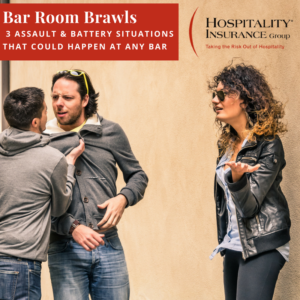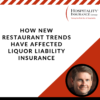June 28th is Insurance Awareness Day – a very exciting day for the insurance industry! It is a day for the experts in the field to share their knowledge about the perplexing world of insurance and to help you better understand the potential risks you face on a daily basis. Whether you own a business, house, car, boat or even a pet, everyone needs some sort of insurance to protect their assets. So today, our knowledgeable and experienced staff are answering some of their most frequently asked questions to [hopefully] make insurance just a little bit easier to understand.
INSURANCE AT A GLANCE
Q: Why buy insurance for my new business?
A: Insurance allows entrepreneurs to start businesses, which helps not only them but the country itself. Without insurance to protect their investment, few people would be willing to risk opening, say, a bar or restaurant. A catastrophic loss paid out of pocket could result in not only the closing of the business, but a disastrous financial impact on the owners. Transferring the risk of damage to a building from a fire, or a possible lawsuit from someone falling on the premises, to an insurer allows a business to generate economic activity that benefits the owners, the employees, and society at large.
Q: Why should I purchase liquor liability insurance?
A: States impose varying degrees of responsibility for those engaged in manufacturing, selling, or serving alcoholic beverages. Serving an intoxicated person or a minor may result in a lawsuit against you, the business owner. Depending on the circumstances, the suit may take years to resolve. Even if you are found not liable, the legal fees alone could bankrupt you and your business. Transferring the risk to an insurance carrier means you transfer not only the legal costs but the amount of the verdict, if any, up to the limits of the policy.
Q: Are bars and restaurants required to carry liquor liability insurance?
A: Some states require establishments that serve, sell or assist in the purchasing of liquor to carry Liquor Liability insurance and some do not. However, even in the states that do not mandate this coverage, as the owner of an establishment of this nature, you could be required to purchase insurance by a financial institution or a lease agreement if you have taken out a loan or if you are renting space. In any event, to carry this insurance could mean the difference between having to close your doors or continuing to run a successful business should you ever be faced with a lawsuit.
Q: Is a temporary event policy necessary if I am hosting an event where liquor is going to be served?
A: The summer holiday season is upon us and with that comes celebrations that you may be hosting. It is important to consider purchasing liquor liability insurance to protect yourself against potential claims that may arise from over service of alcohol. Once a suit is filed, all individuals involved in hosting the event could find themselves named in a suit. A temporary event policy will help to offer protection should you find yourself in this situation!
Q: What is underwriting and what role does it serve within the insurance industry?
A: Underwriting is the process of evaluating insurable loss exposures, accepting or rejecting them, classifying accepted risks, and determining the appropriate price. Underwriting serves both the insurer as well as the insurance buyers by helping the insurer avoid adverse selection.
Q: How can I save money on my insurance?
A: Most insurance companies offer cost-saving incentives for businesses that insure with them. Know what your insurance company offers for discounts and make sure you are getting all that you are eligible for. Most insurance companies have filed for insurance credits for those insureds who meet certain criteria. For example, at Hospitality Insurance Group we offer a discount for those establishments that have trained their staff on the safe service of alcohol. Many agents/insureds are not aware of the discounts that are being offered by their insurance company. You should speak with the insurance company and find out what credits they allow and make certain that you request the discount if you meet their criteria.
COVERAGES
Q: What does Coverage C-Medical Payments cover on my CGL Policy and how does it differ from Coverage A- Bodily Injury and Property Damage Liability?
A: Coverage C-Medical Payments coverage includes first aid administered at the time of the accident along with necessary medical, surgical, X-ray, and dental services. Coverage C differs from Coverage A because is not liability and pays regardless of whether the insured is legally liable.
Q: Is an umbrella policy or excess coverage necessary to purchase for my business?
A: Standard business liability coverage will be enough in most situations, but when serious situations arise, commercial umbrella insurance or excess liability coverage will help ensure that your business is protected. Umbrella/Excess liability insurance protects you when accidents happen and your existing liability insurance policies cannot cover all the expenses. Essentially, it picks up where your business auto liability, general liability, liquor liability or other liability coverage stops, providing extra protection against bodily injury and/or property damage.
Q: Is there a difference between an umbrella policy and an excess liability policy?
A: Yes there is definitely a difference between these two policies.
An excess policy also known as a follow form policy, follows the same coverage and exclusions as your underlying policies (general liability, commercial auto, liquor liability, etc.). If there is no coverage in the underlying policies then there is no coverage in the excess policy. The excess policy provides you with higher liability limits. Typically your underlying policies will provide you with limits of $1,000,000 per occurrence (each incident) with a $2,000,000 aggregate (annual policy payout). If you need higher limits you would purchase an excess policy to provide you with those higher liability limits.
An umbrella policy also expands the limit that your company already has in its existing, or underlying, liability policies. However, an umbrella policy will usually broaden coverage for things that your underlying policies may not cover. If your auto liability policy covers accidents that might occur in a specific area, an umbrella policy could expand the coverage territory.
Both policies will provide you with higher liability limits for bodily injury and property damage. However, the umbrella policy may broaden coverage for things that are not covered in the underlying policies while an excess policy will ONLY pay based on the coverage that you have in the underlying policies.
Q: Am I covered for food spoilage if my refrigerators/freezers break or if there is a power outage during a storm?
A: Depending on the insurance company and the coverage form that is being offered you may or may not be covered. Some forms include a set limit for spoilage that can be increased if more coverage is needed. Some forms will automatically include spoilage but not provide coverage for power outage. Even if the form you are purchasing does not include spoilage, almost all insurance companies will allow you to purchase spoilage coverage and include the perils you want coverage on. So be sure to do some homework here and know what you are getting in the form and what you might need to purchase as additional insurance to meet your needs.
CLAIMS
Q: If someone falls and hurts oneself on a restaurant’s premises, does the person have any recourse against the restaurant?
A: A restaurant may be liable if someone slips or trips and falls on their premises. For example, if someone slips on spilled food or drink inside the restaurant or snow and ice that has not been cleared from a walkway, the restaurant might be held liable for any injuries that person sustains. For the restaurant to be held liable, they would have to have known or should have known about the dangerous condition and failed to warn visitors or clean it up.
Q: Why is it important to report a liability claim as soon as possible even if I do not feel that there is a claim that will be pursued?
A: It is important for the claims adjuster to investigate and gather information as quickly as possible to make a complete liability decision. Failure to report in a timely manner could result in loss of important investigative material that could change the outcome of the claim. Even if you do not feel a claim will be pursued, you should report it so the adjuster can complete a thorough first party investigation in the event the other party resurfaces down the road.
Q: As a business owner, what relevant information needs to be provided when a liability claim is reported?
A: In order to assist the claims adjuster with his/her investigation it is important to provide a copy of the surveillance video capturing the incident. If available, scene photos, and witness names/contact information are also important pieces of information to provide in your incident report. The more evidence that is preserved, the better for the investigation process.
Q: What is the importance of providing an employee’s personal contact information if he/she was a witness to an incident?
A: In case the matter goes into litigation at a later date and the employee is no longer employed at the insured establishment, the claims adjuster or defense attorney will be able to make contact. Sometimes more detailed information is required.
Q: As a business owner that has suffered a loss, what are my duties after reporting the claim?
A: It is your duty to take all reasonable steps to protect the property from any further damage. You will need to maintain a record of your expenses that were necessary to protect that property from further damage to be considered as part of the settlement. Also, you will need to keep a complete inventory of the damaged and undamaged property to be considered as well. It is also very important that you cooperate with the insurance company in the investigation and/or settlement of the claim.
Please be advised that the opinions expressed are the views of the author alone and should not be attributed to any other individual or entity and shall not constitute a legal opinion.
 For any establishment that serves alcoholic beverages, a fight possibly breaking out is always in the back of any owner’s mind.
For any establishment that serves alcoholic beverages, a fight possibly breaking out is always in the back of any owner’s mind. 







